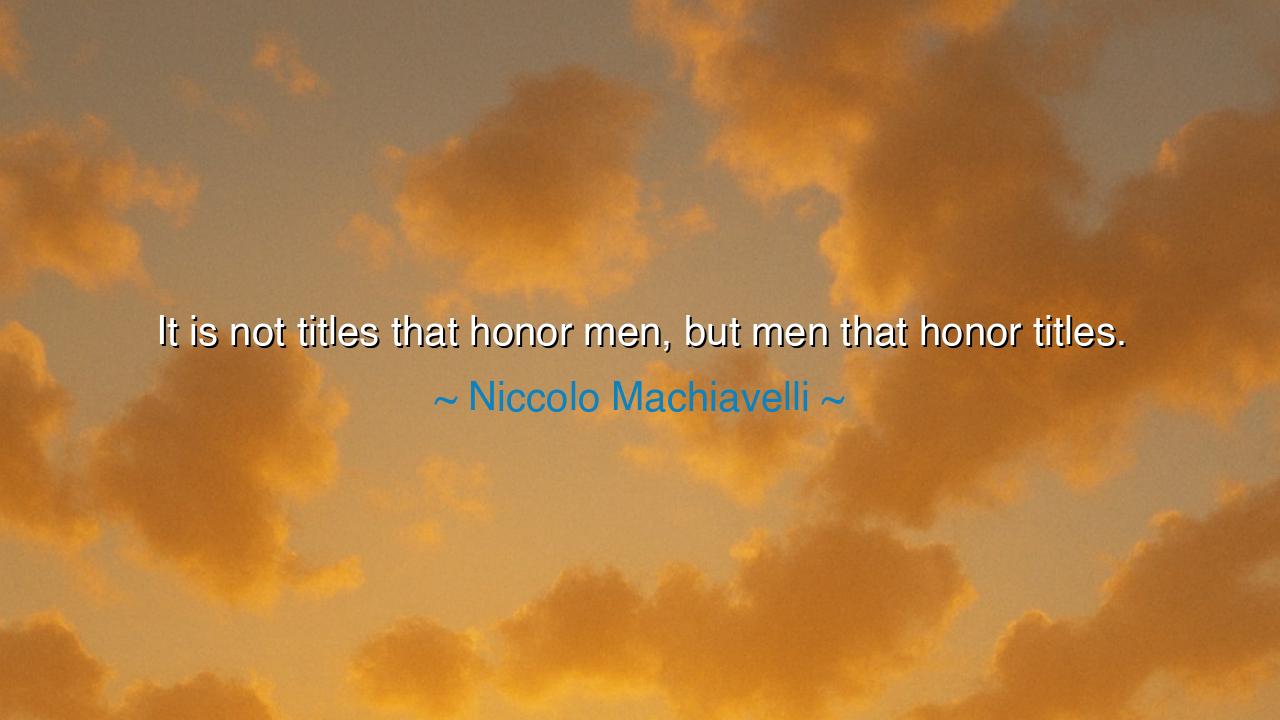
It is not titles that honor men, but men that honor titles.






Niccolò Machiavelli, the Florentine thinker whose wisdom was forged in the fires of power and exile, once wrote: “It is not titles that honor men, but men that honor titles.” In this single line, he captures the eternal truth that dignity does not flow downward from rank or office, but upward from character. The crown, the robe, the insignia—all these are empty until virtue fills them. The weak man borrows honor from his position; the great man lends honor to his. Thus, Machiavelli teaches that true nobility is not inherited—it is earned.
In the courts of Renaissance Italy, where deceit was common and loyalty rare, many believed that prestige alone conferred greatness. Yet Machiavelli saw the folly in this illusion. He observed princes who wore gold and spoke of honor, but whose cowardice or corruption made their rule hollow. He also saw humble men, without title or wealth, whose courage and wisdom commanded respect. The origin of this quote lies in that contrast. Through the chaos of his time, Machiavelli learned that power without virtue collapses, while virtue without power endures. A title may open doors, but only integrity can keep them open.
The ancients understood this law of the spirit. The Roman general Cincinnatus, when called from his plow to lead the republic in its hour of danger, accepted the title of dictator—then, after victory, laid it down and returned to his farm. He did not need the title to be noble; his nobility came from his humility and service. In contrast, emperors who clung to their crowns without justice soon saw them tumble into dust. So too, Machiavelli reminds us that honor flows from action, not position, from the strength of the soul, not the shine of the throne.
Every age repeats this lesson, though few heed it. The modern world still worships rank—celebrity, wealth, office—but often forgets the essence of worth. A leader’s name may be carved in stone, yet if he lacks virtue, his legacy will crumble with time. Meanwhile, countless unseen hearts—teachers, workers, mothers, healers—live with quiet excellence that sanctifies the ordinary. These are the ones who, without title, honor humanity itself. For greatness does not depend on being seen; it depends on being steadfast.
There is deep sorrow in Machiavelli’s observation, for he knew how easily people mistake appearance for substance. A title can deceive, cloaking mediocrity in authority. But time, which unmasks all things, reveals who truly deserves esteem. In this, his words are both warning and encouragement: warning to those who chase position as if it could make them great, and encouragement to those who labor unseen, knowing that true honor cannot be bestowed—it must be embodied.
Consider also the example of Abraham Lincoln, who rose from obscurity, not by birth or privilege, but by conscience and resolve. When he became President, it was not the title that transformed him—it was he who transformed the title. Through compassion, endurance, and vision, he gave the office new moral weight. His life proved Machiavelli’s truth: a title is only as noble as the man who bears it.
Therefore, my listeners, remember this: seek not the crown, but the character to bear one if it comes. Let your deeds give meaning to your position, not your position give meaning to your deeds. The badge of honor is not what rests upon your chest, but what burns quietly within your heart. For titles fade, offices end, applause dies—but virtue, once lived, shines beyond death itself. And in that light, as Machiavelli taught, even the humblest man becomes a king.






AAdministratorAdministrator
Welcome, honored guests. Please leave a comment, we will respond soon